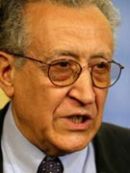UN seeks to persuade Sudan to accept peacekeepers
May 23, 2006 (KHARTOUM) — Senior United Nations diplomats seek to persuade Sudanese President Omar Hassan al-Bashir’s government on Tuesday to accept a U.N. peacekeeping force in the western Darfur region.
 Despite a peace deal signed by the government and the main Darfur rebel group on May 5, dozens have been killed in clashes between rebels and government-armed Arab militias. An African Union (AU) peacekeeping force is cash-strapped and ill-equipped.
Despite a peace deal signed by the government and the main Darfur rebel group on May 5, dozens have been killed in clashes between rebels and government-armed Arab militias. An African Union (AU) peacekeeping force is cash-strapped and ill-equipped.
Khartoum, under international pressure to accept a transition to U.N. peacekeepers, initially resisted and said such a deployment would cause an Iraq-like quagmire that would attract Islamist militants into attacking the U.N. troops.
But since the peace deal was struck, the government has softened its stance and says it does not reject a U.N. force but wants to be consulted about its mandate in Darfur — an arid ethnically mixed region the size of France.
Veteran troubleshooter Lakhdar Brahimi and U.N. peacekeeping head Hedi Annabi are due to arrive for a two-day visit during which they plan to meet Bashir and other government leaders.
“We are hoping that we can work out an agreement with the government because … this (deployment) should not be done without the agreement of the government,” said U.N. deputy spokesman Bahaa Elkoussy.
The U.N. Security Council adopted a resolution this month that envisages U.N. peacekeepers taking over from the some 7,000 AU troops.
TOWNS ATTACKED
The AU force has been monitoring a widely ignored truce in Darfur, but since the May 5 deal militias have grown bolder and attacked towns where the AU has bases.
More than 250,000 people have been forced to flee their homes since the beginning of the year because of the conflict. Frustrated Darfuris have begun to attack the AU force, killing an interpreter earlier this month.
Rebels took up arms in early 2003, accusing the Arab-dominated central government of negelecting Darfur.
Khartoum backed so-called Janjaweed militias, drawn from Arab tribes, to crush the rebels. A campaign of murder, looting, rape and arson has driven more than 2 million people from their homes into camps in Darfur and neighbouring Chad.
The United Nations hopes Brahimi, an Algerian, will be able to deal more easily with the Islamist government in Khartoum. In the past he has tackled issues such as Iraq and Afghanistan.
Despite intense international pressure two of the three rebel Darfur groups involved in peace negotiations refused to sign the May 5 deal, saying it was unfair.
The AU said on Monday Janjaweed militiamen were massing in North and South Darfur and attacking villages.
The Sudan Liberation Army (SLA), the rebel group that signed the peace deal, accused the government of violating the accord by attacking SLA bases in Dar el-Salaam in North Darfur and flying Antonov planes over rebel areas.
“They flew Antonov planes for two hours this morning,” said al-Tayyib Khamis, a SLA spokesman. “They are trying to get as much territory as possible before the U.N. troops come in.”
The government denied the accusation. “There are many empty accusations flying around but none of them are true,” said an armed forces spokesman in Khartoum.
(Reuters)
